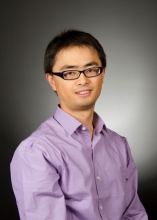MAE Seminar: Radiative Heat Transfer with Nanowire Metamaterials for Energy Applications

Assistant Professor, Arizona State University
Abstract: Recently, nanowire metamaterials have attracted lots of attentions due to their exotic artificial optical and radiative properties. This talk will discuss our recent findings on radiative heat transfer with nanowire metamaterials for energy applications in both far-field and near-field regimes. First, tungsten nanowire metamaterials are theoretically designed and experimentally fabricated. Spectroscopic characterizations demonstrate strong spectral selectivity in absorption/emission to enhance solar thermal energy harvesting. Moreover, when two nanowire arrays are separated by subwavelength vacuum gaps, near-field radiative heat flux can be enhanced beyond classical far-field blackbody limits due to physical mechanisms such as (electrical) surface plasmon/phonon polariton (SPPs) and hyperbolic mode (HM). Near-field thermophotovoltaic energy conversion enhanced by tungsten nanowire metamaterial emitters will be theoretically investigated. Finally, magnetic responses, which usually cannot occur at optical frequencies with natural materials, are artificially realized with nanowire metamaterials, which could further enhance the near-field radiative transfer with magnetic SPPs or HMs.
Bio: Liping Wang received his Ph.D. in mechanical engineering with a focus on nanoscale radiative heat transfer in 2011 at Georgia Institute of Technology under the guidance of Professor Zhuomin Zhang. He started his academic career as an assistant professor at Arizona State University in 2012. Wang’s research aims to selectively control thermal radiation for energy applications by fundamentally understanding and exploring novel physical mechanisms in nanoscale radiative transport. He also has been investigating near-field thermal radiation for energy harvesting and thermal management applications, in addition to the development of novel optical metrologies for thermal characterizations. His research findings have been published in more than 50 peer-reviewed high-impact journal papers in applied physics, optics and heat transfer. He is the recipient of 2017 AFOSR YIP Award and 2015 NSF CAREER Award, in addition to 2013 Top 5% ASU Engineering Faculty Teaching Award.
Share
Upcoming Events
-
MSE 298 Seminar: Catalyst Design For Clean Energy Technologies
-
MAE 298 SEMINAR: Biomechanics of Rotator Cuff
-
CBE 298 Seminar: Micro- and Nanofluidic Systems for Molecular Biosensing, Nanotoxicity, and Optogenetics
-
MSE Special Seminar: Architecting 3D Complex Materials for Sustainability
-
MSE Special Seminar: Decarbonizing Industries for a Climate-resilient Future - From Renewable Energy to Sustainable Material Recovery
